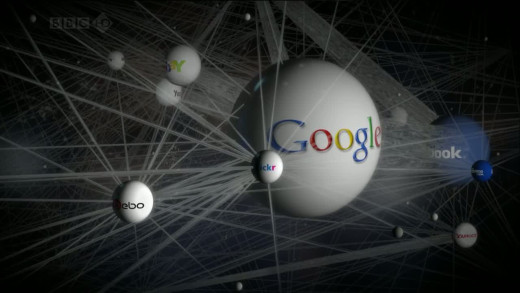This short film uses the history and figure of the Murdoch media empire as a vast invasive machine, to draw parallels to new media machines such as Google that are not only more invasive, but more pervasive than anything the Murdoch media empire has managed. Why are we not more concerned about this?
In 2002, quietly and behind closed doors, the Internet giant Google began to scan millions of books in an effort to create a privatised giant global library, containing every book in existence. Not only this, but they claimed they had an even greater purpose--to create a higher form of intelligence, something that HG Wells had predicted in his 1937 essay "World Brain". Working with the world’s most prestigious libraries, Google was said to be reinventing the limits of copyright in the name of free access to anyone, anywhere. But what can possibly be wrong with this picture? As Google and the World Brain reveals, a whole lot...
20 years on from the invention of the World Wide Web, The Virtual Revolution explores how the Internet is reshaping almost every aspect of our lives. But what is really going on behind this reshaping? The inventor of the Web, Tim Berners-Lee, believed his invention would remain an open frontier that nobody could own, and that it would take power from the few and give it to the many. So how do these utopian claims stand up to today?
Panopticon
Using the analogy of a Panopticon, this film looks at how technology and the convergence of vast data stores together are fuelling one of the most comprehensive attacks on privacy ever before seen. How is modern society being defined by such rapid changes? Where are we heading? By travelling to Germany to show how such attacks have been the basis for past dictatorships, Panopticon asks: Even if you have nothing to hide, do you have nothing to fear? What does privacy mean for you? When precisely does the surveillance state begin? What is your threshold? With a focus on the Netherlands, Panopticon offers a comprehensive analysis challenging the current herd-mentality and apathy about privacy in the modern world.
With its motto "Don't be evil," Google claims it has the best intentions. But there are also claims that Google is slowly turning into Big Brother, keeping track of users and continuously making decisions about the information it provides. Will Google turn out to be the new Library of Alexandria, serving as the great collector that brings the world's information to supposedly everyone, as it claims? Or is it more like a monopolistic, Ministry-Of-Truth-type corporation that challenges the very freedom of information by its stronghold over internet data?
Admit it--you don't really read the endless pages of terms and conditions connected to every website you visit or phone call that you make do you? Of course not. But every day billion-dollar corporations are learning more about your interests, your friends and family, your finances, and your secrets--precisely because of this; and are not only selling the information to the highest bidder, but freely sharing it with the government. And you agreed to all of it. With plenty of recent real-world examples, Terms And Conditions May Apply covers just a little of what governments and corporations are legally taking from Internet users every day--turning the future of both privacy and civil liberties into serious question. From whistleblowers and investigative journalists to zombie fan clubs and Egyptian dissidents, this film demonstrates how all of us online have incrementally opted-in to a real-time surveillance state, click by click.
Every day, escalating technologies are being used to monitor all of us as populations with unprecedented scrutiny—from driving habits to workplace surveillance, as shoppers, as consumers, as citizens. We are all increasingly being observed and analysed. Internet searches are monitored and used as evidence in court, the police track our movements on the road, governments collect our DNA, fingerprints and iris scans, corporations assemble huge databases for profiling and selling data, while governments collude with such lucrative businesses—for example, Acxiom, Lexis Nexis and ChoicePoint—to gain access to vast volumes of information about people and the machinations of modern society. What will it take for us to stop this system before it boils over into a full-blown technocratic authoritarian regime?
The United States of Secrets chronologically accounts the Bush administration's embrace of illegal and widespread dragnet surveillance and eavesdropping programmes, along with the Obama administration's decision to not only continue them, but to dramatically expand them—despite denials and promises to the contrary. By weaving narratives by those who sought to blow the whistle on these programmes over the decades—culminating with Edward Snowden's unprecedented dump of insider documents in 2013—we see how and why those inside the NSA and other government agencies came to act; what actions were effective, and what role the mainstream media had and continues to have in keeping such secret projects alive and untouchable in the name of 'national security.'






